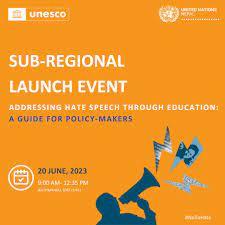
https://www.unesco.org/en/articles/addressing-hate-speech-through-educat...
Online and offline, hate speech hurts, divides and affects communities worldwide. Is there a way to address its growing prevalence globally? And to what extent should preventive approaches be adapted regionally?
UNESCO marks the International Day for Countering Hate Speech with a regional launch of its recently published guide “Addressing hate speech through education” in Kathmandu, Nepal, on 20 June 2023. This new publication, developed jointly by UNESCO and the United Nations office on Genocide Prevention and the Responsibility to Protect (UN OSAPG), highlights education's role in confronting this pressing issue and provides practical recommendations for policy-makers and educators on combating hate speech explicitly and at all levels of education.
At the launch leading voices from across South Asia will discuss:
- the root causes of hate speech and its magnitude in the region vis-à-vis global trends,
- its impact on communities and education systems,
- measures taken by countries to tackle hate speech in and through education,
- and effective prevention and response strategies
In presence of
- Pushpa Kamal Dahal, Prime Minister, Nepal
- Hanaa Singer-Hamdy, United Nations Resident Coordinator in Nepal
Stefania Giannini, UNESCO Assistant-Director General for Education, and Alice Wairimu Nderitu, United Nations Special Adviser on the Prevention of Genocide, will address the participants in their video messages. The high level opening will be followed by hybrid ministerial and expert panels.
Simultaneous translation between English and Nepali will be available. The event will be streamed online on UNESCO Kathmandu Facebook.
The event is organised by UNESCO in partnership with the United Nations Resident Coordinator Office in Nepal and United Nations Information Center (UNIC).
Agenda
Time zone: GMT +5:45 (Kathmandu, Nepal)
Opening performances (9:00-9:30)
Welcome Remarks (9:30-10:00)
- Pushpa Kamal Dahal, Prime Minister, Nepal
- Hanaa Singer-Hamdy, United Nations Resident Coordinator
- Alice Wairimu Nderitu, United Nations Special Adviser on the Prevention of Genocide (video message)
- Stefania Giannini, UNESCO Assistant Director-General for Education (video message)
Session 1 - Addressing hate speech through education: national experiences and practical steps forward (10:05 - 10:50)
Ministerial plenary session, in person and online
Speakers
- Ashok Kumar Rai, Minister of Education, Science and Technology, Nepal
- Dipu Moni, Minister of Education, Bangladesh (video message)
- Fathimath Naseer, Minister of State for Education, Maldives
- A. Aravindh Kumar, State Minister of Education, Sri Lanka
- Himanshu Panday, Co-founder, Dignity in Difference (Youth representative)
Moderated by Michael Croft, UNESCO Representative to Nepal
Session 2 - Countering hate speech through education: best practices, challenges and opportunities (11:15-12:25)
Experts plenary session
Speakers
- Anantha Duraiappah, Director, The UNESCO Mahatma Gandhi Institute of Education for Peace and Sustainable Development (MGIEP)
- Cecilia Jacobs, Chair, Asia-Pacific Working Group, The Global Action Against Mass Atrocity Crimes (GAAMAC)
- Cynthia Miller-Idriss, Professor, American University, United States of America
- Clara Ramirez-Barat, Director of the Warren Educational Policies Program, Auschwitz Institute for the Prevention of Genocide and Mass Atrocities, Spain/United States of America
Moderated by Karel Fracapane, Section for Global Citizenship and Peace Education, UNESCO
Concluding remarks (12:25-12:30)
- Michael Croft, UNESCO Representative to Nepal
Contacts










Add new comment